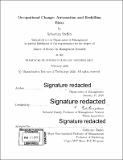| dc.contributor.advisor | Erik Brynjolfsson. | en_US |
| dc.contributor.author | Steffen, Sebastian(Scientist in business management)Massachusetts Institute of Technology. | en_US |
| dc.contributor.other | Sloan School of Management. | en_US |
| dc.date.accessioned | 2020-10-19T00:43:17Z | |
| dc.date.available | 2020-10-19T00:43:17Z | |
| dc.date.copyright | 2020 | en_US |
| dc.date.issued | 2020 | en_US |
| dc.identifier.uri | https://hdl.handle.net/1721.1/128103 | |
| dc.description | Thesis: S.M. in Management Research, Massachusetts Institute of Technology, Sloan School of Management, May, 2020 | en_US |
| dc.description | Cataloged from the official PDF of thesis. | en_US |
| dc.description | Includes bibliographical references (pages 45-47). | en_US |
| dc.description.abstract | We derive a novel occupation-industry level panel of skill demands from the near-universe of tagged online job postings in the US for the last decade (2010-2018). We use this data to study how the skill demands of occupations have changed and how these changes affect the returns to skills. Low- and medium-wage occupations' skill demands changed more than those of high-wage ones. Thus, lower-wage workers face not only higher risks of technological displacement but also increased risks of reskilling in order to stay productive. We show that routine-biased technological change (RBTC) due to automation technologies such as ML can best explain these results, while skill-biased and (endogenously) directed technological change cannot. Technical skills, such as ML, Business, Software, and Data Skills have particularly high implied market values, as do Social Skills and Creativity. These therefore represent lucrative (re-)skill investment opportunities for workers, unlike writing and non-cognitive skills. Finally, there is significant heterogeneity in industry fixed effects with the Utilities, Mining, Management and IT Industries offering much higher returns than the Food and Retail industries, even after controlling for skills. | en_US |
| dc.description.statementofresponsibility | by Sebastian Steffen. | en_US |
| dc.format.extent | 47 pages | en_US |
| dc.language.iso | eng | en_US |
| dc.publisher | Massachusetts Institute of Technology | en_US |
| dc.rights | MIT theses may be protected by copyright. Please reuse MIT thesis content according to the MIT Libraries Permissions Policy, which is available through the URL provided. | en_US |
| dc.rights.uri | http://dspace.mit.edu/handle/1721.1/7582 | en_US |
| dc.subject | Sloan School of Management. | en_US |
| dc.title | Occupational change : automation and reskilling risks | en_US |
| dc.type | Thesis | en_US |
| dc.description.degree | S.M. in Management Research | en_US |
| dc.contributor.department | Sloan School of Management | en_US |
| dc.identifier.oclc | 1200238355 | en_US |
| dc.description.collection | S.M.inManagementResearch Massachusetts Institute of Technology, Sloan School of Management | en_US |
| dspace.imported | 2020-10-19T00:43:16Z | en_US |
| mit.thesis.degree | Master | en_US |
| mit.thesis.department | Sloan | en_US |
